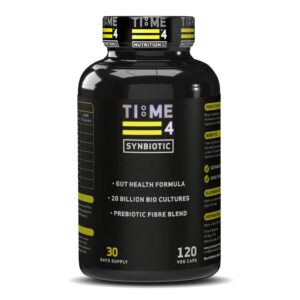What is a Synbiotic?
What is a Synbiotic?
What is a Synbiotic? – Prebiotic & Probiotic Supplement
(Click on the Reference Numbers in Blue for More Info)
It’s not so long ago that most people would have considered bacteria in the gut to be a bad thing, perhaps being the cause or sign of disease. While some bacteria are detrimental to good health, the importance of ‘good’ or ‘friendly’ bacteria is now widely acknowledged, with a range of probiotic food products and supplements available to encourage the growth and maintenance of healthy gut bacteria. This is with good reason when you consider that an estimated 70-85% of the immune system lies in the gut, and the amount of bacteria in the gut outnumbers the cells of the body by approximately ten to one.
It is estimated that we have around 100 trillion micro-organisms in our gut, most of which are bacteria. In fact, the gut is home to up to 1,000 species of bacteria, which are sometimes referred to as gut flora or gut microbiota.
We still do not fully understand the relationship between health and gut bacteria, but it is clear that the microbiota and its host have a symbiotic relationship, which means that both parties benefit from the presence of the other. The host provides a favourable environment for the bacteria to flourish and in turn, the bacteria perform various important functions.
These include:
- Synthesising important substances including vitamins K and B and healthy fatty acids
- Maintaining the health of the gut lining to prevent infections crossing into the blood
- Breaking down fibre and cellulose into valuable compounds
- Supporting immune system, keeping it healthy and functioning effectively
- Aiding nutrient absorption
- Contributing to heart and brain health
In recent years, it has become evident that the microbiota is not only essential for the normal health and functioning of the gut, but may even affect how we feel, reduce fatigue, help us to maintain a healthy bodyweight, improve athletic performance and increase muscle mass.
What is a Synbiotic? – Dysbiosis
When the quantity and proportion of the friendly bacteria are reduced, the harmful strains and pathogens are allowed to grow unchecked, which can result in an imbalance known as dysbiosis. This can be serious, as it is often the precursor to a number of chronic health conditions ranging from irritable bowel syndrome (IBS) and inflammatory bowel disease to diabetes, heart disease, rheumatoid arthritis, Parkinson’s disease and certain cancers.
Dysbiosis in the gut is typically due to one or more of the following:
- Antibiotics and antibacterial medications
- Poor diet, such as the high consumption of sugars, refined starch and processed foods and food additives
- The presence of harmful chemicals and toxins in foods, such as pesticides on unwashed fruit, vegetables and cereals.
- Excessive alcohol consumption
- Poor dental hygiene, which allows bacteria to grow out of balance in the mouth
- High levels of stress, anxiety or depression, which negatively impact on the immune system
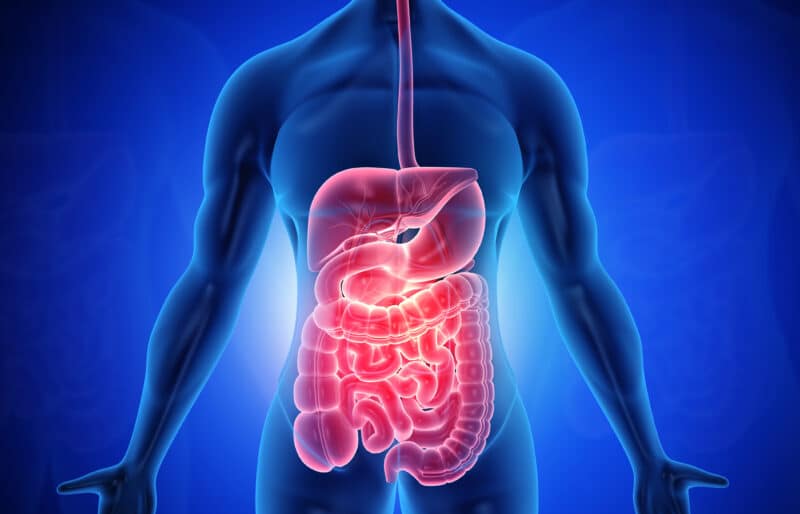
What is a Synbiotic? – How Can We Maintain Healthy Gut Bacteria?
The importance of maintaining the correct levels of healthy bacteria is clear and there are a number of things we can to do ensure this. These include:
- Consuming a diverse range of foods: A diverse diet rich in high fibre foods such as fruit, vegetables, legumes and beans can help to promote the growth of healthy gut bacteria.
- Consuming fermented foods: Fermented foods such as yogurt, sauerkraut and kefir all contain healthy bacteria, which can reduce the amount of unhealthy bacteria in the gut.
- Only using antibiotics when necessary: Antibiotics can kill both bad and good bacteria in the gut. Therefore, we should only take antibiotics when medically necessary.
- Breastfeeding for at least six months: Breastfeeding is very important for the development of healthy gut bacteria. Children who are breastfed for at least six months tend to have higher levels of certain healthy bacteria than those children who are bottle-fed.
- Consuming whole grains: Whole grain foods contain high levels of fibre and beneficial carbohydrates such as beta-glucan, which are digested by gut bacteria and provide health benefits including maintaining a healthy weight, and reducing the risk of cancer risk, diabetes and other conditions.
- Consuming a plant-based diet: Plant based diets may help to reduce the levels of certain unhealthy bacteria such as E. Coli.
- Consuming foods high in polyphenols: Polyphenols are naturally occurring plant compounds found in whole grain foods, red wine, green tea, dark chocolate, and olive oil, which help to stimulate healthy bacterial growth.
- Consume prebiotic supplements and foods: Prebiotics are from of fibre which stimulates the growth of healthy bacteria. They can be thought of as a type of ‘food’ for your good bacteria, helping them to thrive. Examples of prebiotic foods include artichokes, bananas, asparagus, oats and apples.
- Use a probiotic supplement:Probiotics supplements contain live micro-organisms which, when administered in adequate amounts, confer a health benefit on the host. They can be particularly beneficial for restoring the gut bacteria to healthy levels after they have become unbalanced, perhaps due to illness, poor diet, or the use of antibiotics.
This is where Time 4 Synbiotic can be a valuable addition to your diet. Here at Time 4 Nutrition, we pride ourselves on employing the findings of latest cutting-edge research to produce the most effective, innovative, evidence-based products.
In this what is a synbiotic article, we are going to review a selection of that research and explain how there’s a lot more to Time 4 Synbiotic than you may think.
What’s In Time 4 Synbiotic?
Time 4 Synbiotic contains a potent combination of 5 specific strains of live, friendly bacteria called probiotics and a blend of prebiotic fibre. These include organic Psyllium Husk powder, organic Acacia fibre powder and the microorganisms Lactobacillus Acidophilus, Lactobacillus Casei, Lactobacillus Plantarum, Bifidobacterium Bifidum, and Bifidobacterium Longum.
In this what is a synbiotic article we look at each of these ingredients in-depth, you’ll begin to see why Time 4 Synbiotic is such a great product and how it may benefit you.
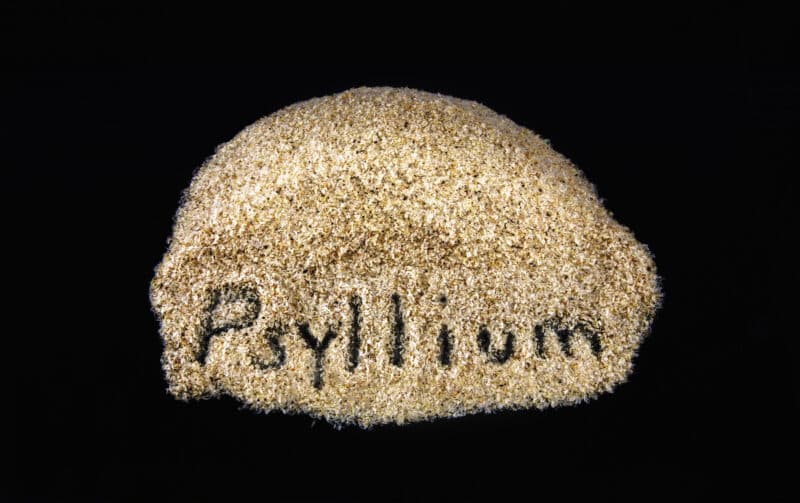
What is a Synbiotic? – Psyllium Husk Powder?
Psyllium is a type of fibre made from the husks of the Plantago Ovata plant’s seeds. It is a medicinal plant native to Mediterranean region and naturalised in central, eastern, and south Asia and North America. It sometimes referred to by a number of other names including ispaghula, blond plantain, desert Indian wheat and blond psyllium.
Psyllium is associated with numerous health benefits particularly for the digestive system including the promotion of regular bowel movements to prevent constipation, and acting as a prebiotic. It can also contribute to heart health by lowering blood pressure and managing cholesterol and blood sugar levels, and assist in the maintenance of a healthy bodyweight.
What Does The Science Say About Psyllium?
Jalanka and colleagues (1) investigated the effect of psyllium husk on intestinal microbiota in constipated patients and healthy controls. The results of the study showed that while a Psyllium supplement had a small but significant effect on the microbial composition of healthy adults (increasing Veillonella and decreasing Subdoligranulum), in constipated subjects there were greater effects on the microbial composition (increased Lachnospira, Faecalibacterium, Phascolarctobacterium, Veillonella and Sutterellaand decreased uncultured Coriobacteria and Christensenella). In summary, the authors note than Psyllium supplementation increased stool water and this was associated with significant changes in microbiota, most marked in constipated patients, which contribute to improved gut function.
A study by Yang et al., (2) investigated the effects of Psyllium husk on gut microbiota composition and function in chronically constipated women of reproductive age. The study compared faecal microbiota after treatment with placebo and Psyllium husk. The results showed that Psyllium husk relieved the symptoms of constipation and the Psyllium husk group exhibited a different gut microbiota composition compared to that of the placebo group. The authors concluded that the composition of gut microbiota was altered and that symptoms of constipation were alleviated via Psyllium husk intervention and these results concur with those of other recent studies, which have shown that Psyllium husk can improve the clinical symptoms of constipation by regulating gut microbiota.
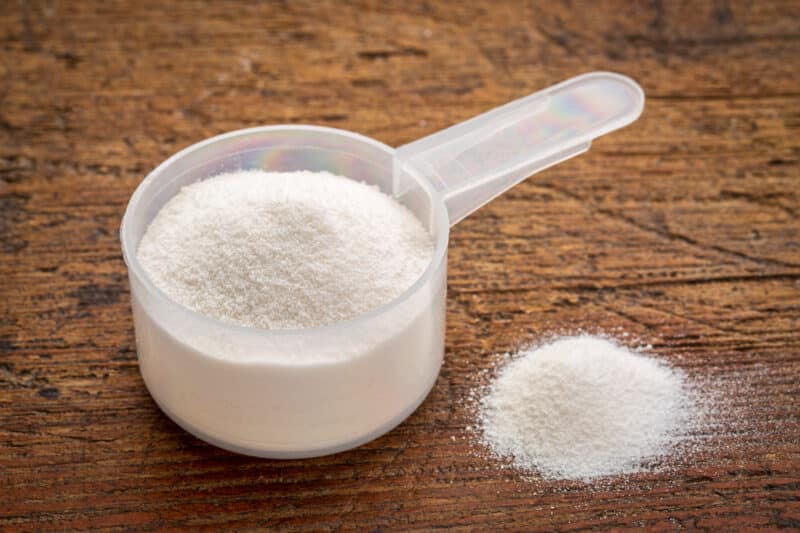
What is a Synbiotic? – Acacia Fibre Powder?
Acacia powder is made by grinding up acacia gum, which is made from the sap of the acacia tree. This grows mainly in Africa and India and has long been used in medicines, as a food ingredient and for other everyday applications by civilizations as ancient as the Egyptians and the aboriginal tribes of Australia.
Numerous health benefits have been associated with acacia gum, ranging from enhancing wound healing and promoting good oral health to aiding weight loss.
Acacia gum is a good source of dietary fibre. Fibre, also known as non-starch polysaccharides, is a substance found in the walls of vegetables, fruits, pulses and cereal grains that cannot be digested but helps other food and waste products to move through the gut to help maintain digestive health. Fibre can also help to make us feel full, which means that we’re less likely to overeat and gain weight. Fibre not only contributes to healthy gut function but can also provide a range of other health benefits.
What Does The Science Say About Acacia Fibre?
Otles and Ozgoz (3) reviewed the health benefits of dietary fibre and noted that it helps to regulate functions of the large intestine (bowel) and has important physiological effects on glucose, fat metabolism, the availability of minerals and the function of the immune system. The authors also highlighted the protective effect that dietary fibre has against certain gastrointestinal diseases, constipation, haemorrhoids, colon cancer, gastroesophageal reflux disease, duodenal ulcer, diverticulitis, obesity, diabetes, stroke, hypertension and cardiovascular diseases.
Many of the health benefits of acacia fibre come from its status as a prebiotic. For example, a study by Chundakkattumalayil et al., (4) assessed the effects of probiotic (Lactobacillus Plantarum MBTU-HK1), prebiotic (acacia gum) (singly or in combination as a symbiotic) in mice. The symbiotic group was found to possess lowered cholesterol levels and enhanced protein and mineral content. The probiotic and symbiotic groups showed enhanced aspects of immune function and antioxidant capability. Bacterial procarcinogenic faecal enzyme activities were found to be decreased, proving their role in the prevention of colon cancer incidence. The authors suggest that these results demonstrate the potency and safety of oral administration of L. Plantarum MBTU-HK1 and acacia gum either individually or in combination.
Min and colleagues (5) investigated the effect of composite yogurt enriched with acacia fibre and Bifidobacterium Lactis in patients with irritable bowel syndrome. A total of 130 patients were randomly allocated to consume, twice daily for 8 weeks, either the composite yogurt or the control product. The composite yogurt contained acacia dietary fibre and high-dose B. Lactis together with two classic yogurt starter cultures. Improvements in bowel habit satisfaction and overall IBS symptoms from baseline were significantly higher in the test group than in the control group. In constipation-predominant IBS, improvement in overall IBS symptoms was significantly higher in the test group than in the control group. In patients with diarrhoea-predominant IBS, improvement in bowel habit satisfaction from baseline was significantly higher in the test group than in the control group.

Not All Bacteria Are Created Equally
Time 4 Synbiotic contains 5 carefully selected specific strains of live, friendly bacteria, each of which perform important roles in the body. These are Lactobacillus Acidophilus, Lactobacillus Casei, Lactobacillus Plantarum, Bifidobacterium Bifidum, and Bifidobacterium Longum.

What is a Synbiotic? – Lactobacillus Acidophilus?
Lactobacillus Acidophilus is one of the most important strains of Lactobacillus in the group of lactic acid bacteria. It is typically found in the small intestine, and is widely used as a probiotic supplement in functional foods due to its beneficial regulatory effects on the host, such as immune regulation, anti-inflammatory, and antioxidant activities. It provides a number of specific benefits. These include:
- Maintaining a healthy intestinal wall to ensure the necessary absorption of nutrients.
- Supporting all digestive function.
- Relieving abdominal cramps, gases and diarrhoea.
- Supporting the health of the immune system and urinary tract.
- Improving vaginal microflora in women.
- Producing an enzyme called lactase, which breaks down lactose, a sugar found in milk, into lactic acid.
What Does The Science Say About Lactobacillus Acidophilus?
A study by Hu et al., (6) investigated the preventive effect of Lactobacillus Acidophilus probiotic supplement on medically induced colitis in mice. The mice were randomly divided into five groups. Except for the control group, the other four groups were induced for ulcerative colitis (UC) with dextran sodium sulfate (DSS), and three groups in DSS-groups were treated with L. Acidophilus XY27, L. Bulgaricus, and Salicylazosulfapyridine. The results of the study suggested that L. Acidophilus prevented colitis and alleviated symptoms in mice with DSS-induced UC, and also repaired the intestinal barrier function.
Sazawal et al., (7) conducted a review to evaluate the evidence for the use of probiotic supplements, including Lactobacillus Acidophilus, in the prevention of acute diarrhoea. The results suggests that probiotics significantly reduced antibiotic-associated diarrhoea by 52%, reduced the risk of travellers’ diarrhoea by 8%, and that of acute diarrhoea of diverse causes by 34%. Probiotic supplements reduced the associated risk of acute diarrhoea among children by 57%, and by 26% among adults. The protective effect did not vary significantly among the probiotic strains Saccharomyces Boulardii, Lactobacillus Rhamnosus GG, Lactobacillus Acidophilus, Lactobacillus Bulgaricus, and other strains used alone or in combinations of two or more strains.
Sinn et al., (8) investigated the use of Lactobacillus Acidophilus in the treatment of irritable bowel syndrome (IBS). Forty IBS patients were randomized into a placebo and probiotic supplement group. Four weeks of treatment with L. Acidophilus was associated with a reduced score for abdominal pain or discomfort compared to the baseline. The percent reduction in abdominal pain or discomfort exceeded the placebo scores by more than 20%. There was no drop out or adverse events for either group during the study period. The authors concluded that Lactobacillus Acidophilus appeared to have a beneficial effect in patients with IBS.
King and colleagues (9) conducted a systematic review on the effect of probiotic supplements, specifically Lactobacillus and Bifidobacterium strains, on the duration of acute respiratory infections in otherwise healthy children and adults. The results revealed significantly fewer numbers of days of illness per person, shorter illness episodes and fewer numbers of days absent from day care/school/work in participants who received a probiotic supplement intervention than in those who had taken a placebo.
Ishida et al., (10) evaluated the effects of Lactobacillus Acidophilus strain on the symptoms of Japanese cedar-pollen allergy, which is similar to hay fever. Twenty-three volunteers were asked to drink 100 ml of heat-treated milk fermented with Lactobacillus Acidophilus twice a day, for 6 consecutive weeks. A similar study was carried out during the 2003 season for 10 weeks. A significant improvement of the ocular symptom-medication score (SMS) was observed in 2002 and of the score of distress of life in 2003. The authors concluded that a daily oral intake of Lactobacillus Acidophilus probiotic supplement improved the symptoms of Japanese cedar pollinosis, thereby contributing to the reduction in the use of medications.
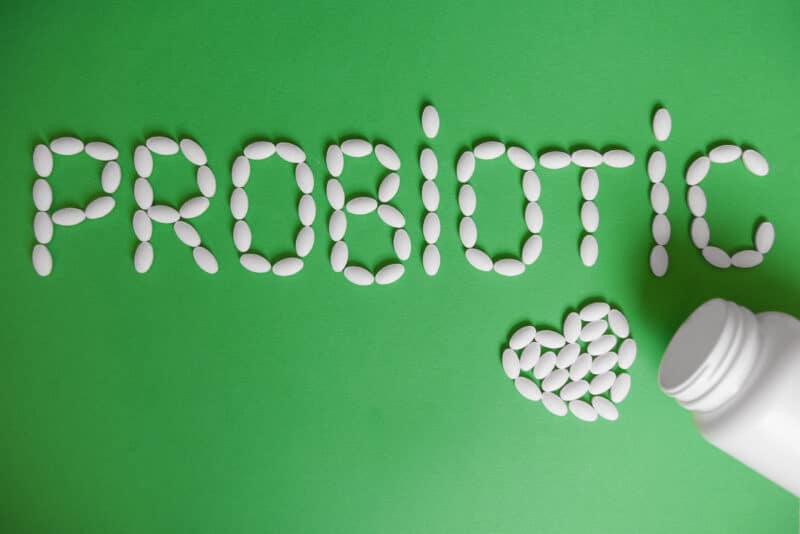
What is a Synbiotic? – Lactobacillus Casei?
Like Lactobacillus Acidophilus, Lactobacillus Casei, or L. Casei is a member of the Lactobacillus group, perhaps the most important and predominant group of good bacteria that live mainly in the human small intestine.
It is associated with a number of benefits including:
- Improving digestion
- Increasing immunity
- Reducing allergies
- Improving cholesterol levels
- Producing vitamins B1 and B2
- Breaking down nutrients for bioavailability
- Decreasing lactose intolerance
Probiotic supplements containing L. Casei have been associated with positive effects on a number of digestive issues including:
- Diarrhoea
- Colic
- Constipation
- Crohn’s disease
- Inflammatory bowel disease (IBD)
- Irritable bowel syndrome (IBS)
- Lactose intolerance
- Ulcerative colitis
What Does The Science Say About Lactobacillus Casei?
A study by Hickson et al., (11) investigated the efficacy of a probiotic drink containing Lactobacillus for the prevention of any diarrhoea associated with antibiotic use and that caused by Clostridium difficile. 135 hospital patients (mean age 74) taking antibiotics consumed a drink containing Lactobacillus Casei, L Bulgaricus, and Streptococcus Thermophilus twice a day during a course of antibiotics and for one week after the course finished. The placebo group received a longlife sterile milkshake. The results of the study showed that 7/57 (12%) of the probiotic group developed diarrhoea associated with antibiotic use compared with 19/56 (34%) in the placebo group. The authors concluded consumption of a probiotic drink containing L Casei, L Bulgaricus, and S Thermophilus can reduce the incidence of antibiotic associated diarrhoea and C difficile associated diarrhoea. This has the potential to decrease morbidity, healthcare costs, and mortality if used routinely in patients aged over 50.
A study by Koebnick and colleagues (12) investigated the effect of a probiotic beverage containing Lactobacillus Casei Shirota (LcS) on gastrointestinal symptoms in patients with chronic constipation. The consumption of LcS resulted in a significant improvement in self-reported severity of constipation and stool consistency, starting in the second week of the intervention phase. Severe and moderately severe constipation was observed less in the LcS group. The results indicate a beneficial effect on gastrointestinal symptoms of patients with chronic constipation.
Alipour et al., (13) investigated the effects the effects of Lactobacillus Casei 01 supplementation on symptoms and inflammatory biomarkers of rheumatoid arthritis (RA) in women. Female patients with established RA for more than 1 year, 20-80 years of age and body mass index (BMI) lower than 40, who followed stable medication for 3 months prior to the supplementation, were randomly allocated to receive either one capsule containing 10(8) colony forming units (CFU) of L. Casei 01, or a placebo for 8 weeks. The results of the study showed L. Casei 01 supplementation decreased serum high-sensitivity C-reactive protein (hs-CRP) levels, tender and swollen joint counts, global health (GH) score and DAS28 . More patients in the L. Casei 01 group had moderate response to the treatment. At the end of the study, a significant difference was observed between the two groups for IL-10, IL-12 and TNF-α changes through the study course in favour of the probiotic group.
Recent evidence has shown that Lactobacilli play an important role in the relief of irritable bowel syndrome (IBS) symptoms. However, few studies have addressed the mechanisms by which Lactobacilli exert their beneficial effects on intestinal epithelial permeability. Hou and colleagues (14) compared miRNA expression levels in intestinal epithelial cells (IECs) under Lactobacillus Casei (L. Casei LC01) treatment. The results of the study demonstrate that L. Casei LC01 regulates intestinal permeability of IECs through miR-144 targeting of OCLN and ZO1. L. casei LC01 can be a possible therapeutic target for managing dysfunction of the intestinal epithelial barrier.

What is a Synbiotic? – Lactobacillus Plantarum?
Lactobacillus Plantarum is the third member of the Lactobacillus group, or lactic acid bacterium, contained in Time 4 Synbiotic. It is commonly found in fermented food and in the gastrointestinal tract, and is often used in the food industry as a potential starter probiotic. Among the lactic acid bacteria, L. Plantarum has attracted a lot of attention from the scientific community due to its wide applications in the medical field with antioxidant, anti-inflammatory, antiproliferative, anti-obesity and antidiabetic properties.
- Plantarum is known for its ability to produce hydrogen peroxide, which the body uses as a line of defence against bacteria in food, as well as other microorganisms. It has also been shown to support the whole digestive process, boost the immune system, produce B vitamins, aid the absorption of iron and calcium, contribute to gut health and function and enhance athletic performance.
What Does The Science Say About Lactobacillus Plantarum
A study by Lee et al., (15) investigated the role of Lactobacillus Plantarum (PL-02), in improved exercise endurance performance, reduced fatigue biochemical parameters, and changes in body composition in mice. The results showed that 4 weeks of PL-02 supplementation could significantly increase muscle mass, muscle strength and endurance performance, and hepatic and muscular glycogen storage. Furthermore, PL-02 could significantly decrease lactate, blood urea nitrogen (BUN), ammonia, and creatine kinase (CK) levels after exercise. The authors concluded that PL-02 can be used as a supplement to improve exercise performance and for its anti-fatigue effect.
Huang and colleagues (16) investigated the effect of Lactobacillus Plantarum (TWK10) on exercise physiological adaptation, performance, and body composition in healthy humans. A total of 54 healthy participants aged 20-30 years without professional athletic training were enrolled and randomly allocated to the placebo, low 3 × 1010 colony forming units and high dose TWK10 administration groups. The functional and physiological assessments were conducted by exhaustive treadmill exercise measurements, and related biochemical indices were measured before and after six weeks of administration. The results showed that TWK10 significantly elevated the exercise performance in a dose-dependent manner and improved the fatigue-associated features correlated with better physiological adaptation. The change in body composition shifted in the healthy direction for TWK10 administration groups, especially for the high TWK10 dose group, which showed that body fat significantly decreased and muscle mass significantly increased. The authors suggest that TWK10 has the potential to be an ergogenic aid to improve aerobic endurance performance via physiological adaptation effects.
Huang et al., (17) investigated the effects of Lactobacillus Plantarum supplementation on triathletes. The triathletes were assigned to one of two groups with different exercise intensity stimulations with different time-points to investigate the effects of body compositions, inflammation, oxidative stress, performance, fatigue, and injury-related biochemical indices. The results showed that L. Plantarum supplementation, combined with training, can significantly alleviate oxidative stress after a triathlon (p < 0.05). In addition, L. Plantarum can also substantially increase plasma-branched amino acids and elevate exercise performance, as compared to the placebo group. The authors conclude that L. Plantarum may be a potential ergogenic aid for better training management, physiological adaptations to exercise, and health promotion.
A study by Huang and colleagues (18) investigated how the microbiota of triathletes are altered by L. Plantarum PS128 supplementation, not only for exercise performance but also for possible physiological adaptation. The triathletes were assigned to two groups: an L. Plantarum 128 supplement group (LG) and a placebo group (PG). Both groups continued with their regular exercise for the next 4 weeks. The results showed PS128 significantly increased the athletes’ endurance, by about 130% as compared to the PG group, but there was no significant difference in maximal oxygen consumption (VO2max) and composition between groups. The PS128 supplementation (LG) modulated the athlete’s microbiota. Also, the short-chain fatty acids of the LG were significantly higher than the PG, which might be a result of a modulation of the associated microbiota.

What is a Synbiotic? – Bifidobacterium Bifidum?
Like Lactobacillus, Bifidobacteria are a family of billions of bacteria. They are located mainly in the walls of the colon and help to prevent the spread of harmful bacteria and other pathogenic microorganisms and their occupation in the intestinal wall.
Bifidobacteria also produce lactic acid and acetic acid, which provide up to 70 percent of the energy needed for intestinal wall cells to increase the natural protective barrier in the gut.
Bifidobacterium Bifidum is among the first bacteria to occupy the intestinal walls of infants and continues to do so throughout life. It is one of the major groups of bacteria in the entire colon and in the small intestine and helps to create balanced intestinal bacteria and prevent the growth of unwanted bacteria, fungi and yeast by attaching to the intestinal lining more effectively than strains of pathogenic bacteria. The role of the B. Bifidum is also to help break down digestible carbohydrates, fats and proteins. It has received considerable media attention recently due to its proposed health benefits, which include:
- Supporting digestive function
- Aiding the absorption of nutrients
- Helping to reduce diarrhoea
- Bifidummay also aid in the treatment of the following conditions:
- Infection by Helicobacter pylori (H. pylori)
- Irritable bowel syndrome (IBS)
- Restoration of intestinal bacteria after chemotherapy
- Constipation
- Lung infections
- Ulcerative colitis
- Certain kinds of diarrhoea
- Necrotizing enterocolitis, a type of infection in the intestinal lining caused by harmful bacteria
- Pouchitis, a complication of surgery for ulcerative colitis
What Does The Science Say About Bifidobacterium Bifidum?
A study by Guglielmetti et al., (19) examined the efficacy of Bifidobacterium Bifidum in the treatment of IBS. A total of 122 patients were randomised to receive either placebo (N=62) or Bifidobacterium Bifidum (N=60) once a day for 4 weeks. The severity of IBS symptoms was recorded daily on a 7-point Likert scale. The results showed that Bifidobacterium Bifidum significantly reduced the global assessment of IBS symptoms when compared with the placebo group. It also significantly improved the IBS symptoms pain/discomfort, distension/bloating, urgency and digestive disorder. The evaluation of the SF12 sum scores showed a significant gain in quality of life within the Bifidobacteria group. Furthermore, adequate relief was reported by 47% of the patients in the Bifidobacteria and only by 11% of the patients in the placebo group. Overall Bifidobacteria was well tolerated and adverse events were not different from placebo.
Turroni and colleagues (20) investigated the role of Bifidobacterium Bifidum in immune function. The results of the study showed significant changes in the transcription of genes that are known to be involved in immunity after exposure and colonisation of intestinal cells with Bifidobacterium Bifidum. Furthermore, results showed that exposure to B. Bifidum causes enhanced production of interleukin 6 (IL-6) and IL-8 cytokines, important components of immune system. The authors concluded that the results strongly suggest that Bifidobacterium Bifidum modulates the innate immune response of the host.
Pue at al., (21) investigated the effects of probiotic supplementation on gastrointestinal (GI) symptoms, circulatory markers of GI permeability, damage, and markers of immune response during a marathon race. Twenty-four recreational runners were randomly assigned to either supplement with a probiotic (PRO) capsule (Lactobacillus Acidophilus (CUL60 and CUL21), Bifidobacterium Bifidum (CUL20), and Bifidobacterium Animalis subs p. Lactis (CUL34)] or placebo (PLC) for 28 days prior to a marathon race. The results of the study showed that during the marathon, GI symptom severity during the final third was significantly lower in PRO compared to PLC. The lower symptom severity was associated with a significant difference in reduction of average speed from the first to the last third of the race between PLC (- 14.2 ± 5.8%) and PRO (- 7.9 ± 7.5%). The authors concluded that probiotics supplementation was associated with a lower incidence and severity of GI symptoms in marathon runners, although the exact mechanisms are yet to be elucidated, and that reducing GI symptoms during marathon running may help maintain running pace during the latter stages of racing.

What is a Synbiotic? – Bifidobacterium Longum?
Bifidobacterium Longum is one of the most common Bifidobacteria found in the gastrointestinal tract. It provides a number of benefits, including:
- Supporting digestive function
- Serving as an antioxidant
- Aiding detoxification
- Boosting the immune system
- Aiding the fermentation of sugars into lactic acid, which helps to regulate and lower the pH of the gut.
What Does The Science Say About Bifidobacterium Longum?
A study by Abrantes et al., (22) evaluated the effects of Bifidobacterium Longum on the intestinal lining and inflammatory response in chemically induced colitis in mice. Two periods of administration were performed: treatment (T) group, mice received Bifidobacterium only during disease induction (7 days); total treatment (TT) group, mice received Bifidobacterium for 10 days before and during disease induction. The results of the study showed that Bifidobacterium administration in the TT group attenuated severe lesions in the colon and reduced eosinophil peroxidase level (P<0.05). B. Longum treatment modality was more effective than total treatment and reduced the inflammatory response and its consequences on intestinal lining.
Schellekens and colleagues (23) investigated whether Bifidobacterium Longum has anti-obesity effects in high-fat diet (HFD)-induced obese mice and whether B. Longum APC1472 supplementation reduces body-mass index (BMI) in healthy overweight/obese individuals as the primary outcome. B. Longum effects on waist-to-hip ratio (W/H ratio) and on obesity-associated plasma biomarkers were analysed as secondary outcomes. The results of the study showed that B. Longum APC1472 supplementation was associated with decreased bodyweight, fat depots accumulation and increased glucose tolerance in mice. While, in healthy overweight/obese adults, the supplementation of B. Longum APC1472 strain did not change primary outcomes of BMI or W/H ratio, a positive effect on the secondary outcome of fasting blood glucose levels was found.
Huang and colleagues (24) noted that physiological fatigue, mental stress, and gastrointestinal discomfort under the demands of athletic performance as well as immunosuppression are common during endurance training and competition, and yet limited studies investigated the functional effects of probiotic supplementation on endurance training. To address this, the researchers assigned mice to sedentary, exercise, Bifidobacterium Longum (OLP-01), or exercise + OLP-01 groups and administered probiotic and/or treadmill exercise training for six weeks to assess exercise performance, physiological adaption, and related metabolites.
The results showed that exercise + OLP-01 group demonstrated higher performance in terms of endurance and grip strength, as well as improved fatigue-associated indexes and glycogen content compared with the other groups. OLP-01 supplementation significantly ameliorated inflammation and injury indexes caused by prolonged endurance exercise test.
The authors concluded that OLP-01 probiotics are considered to be a nutritional strategy for improving physiological adaption, oxidative stress, inflammation, and energy balance to ensure high physical performance. Based on these results, probiotics combined with exercise training is a potential strategy for ensuring high physical performance of athletes.

What is a Synbiotic? – The Gut-Brain Axis (GBA)
So far in this article, we have seen how both prebiotics and probiotics provide many benefits for health and physical performance, but the benefits don’t end there. Not only is the gut microbiota essential to general health and the immune function but has now been shown to play a major role in the communication between the gut and the brain, which is known as the gut-brain axis (27). This interaction between microbiota and GBA appears to be bidirectional, i.e., involves signalling from gut-microbiota to brain and from brain to the gut. More specifically it consists of communication between the central nervous system (brain and spinal cord) and the nervous system of the gastrointestinal tract, linking emotional and cognitive centres of the brain with gut functions (27). Consequently, evidence suggests that dysbiosis is not only associated with metabolic disorders such as obesity and diabetes mellitus, but also neuropsychiatric disorders including schizophrenia, autism, anxiety and depression, and functional gastrointestinal disorders, particularly irritable bowel syndrome (IBS) (27).
While dysbiosis is associated with various neuropsychiatric disorders, supplementation with probiotics has been shown to improve such conditions.
For example, a study Akkasheh et al. (28), investigated the effects of probiotic administration on clinical and metabolic responses in patients with major depressive disorder (MDD). 40 patients with a diagnosis of MDD aged between 20 and 55 years were randomly allocated into two groups to receive either probiotic supplements or placebo for 8 weeks. The Probiotic capsule consisted of Lactobacillus Acidophilus, Lactobacillus Casei and Bifidobacterium Bifidum. The results of the study showed that after 8 weeks of intervention, patients who received probiotic supplements had significantly decreased levels of depression compared with the placebo group.
Synbiotic: What’s In A Name?
The name ‘synbiotic’ was not chosen because it is catchy or easy to remember but because it is the scientific term that describes the product: Synbiotics are a combination of prebiotics and probiotics that work together to inhibit the growth of pathogenic bacteria and enhance the growth of beneficial organisms.
The concept of consuming prebiotics and probiotics together in a synbiotic is supported by a number of studies. For example, Baştürk et al., (25) investigated investigated the efficacy of synbiotic (Bifidobacterium Lactis B94 with inulin), probiotic (B. Lactis B94), and prebiotic (inulin) treatment for IBS in a paediatric age group. The results of the study showed that the administration of synbiotics and probiotics resulted in significant improvements in initial complaints when compared to prebiotics. Additionally, there was a significantly higher number of patients with full recovery from IBS symptoms in the synbiotic group than in the prebiotic group.
Ferrarese and colleagues (26) reviewed the evidence for the use of prebiotics, probiotics and synbiotics in the treatment of obesity. The results showed that diet supplementation with synbiotics prepared using selected strains exerted weight-reduction and anti-inflammatory activity in large independent studies.
In Closing
Time 4 Synbiotic provides you with a blend of 5 evidence-based, shelf stable strains of live, friendly bacteria, giving you a daily dose of 20 billion CFU and a blend of prebiotic fibre to stimulate the growth of good bacteria in your gut and support overall intestinal health. We have seen how these can provide a wide range of health and performance benefits, and the problems that can rise when the balance in gut bacteria becomes disrupted. However, you may still be thinking how will Time 4 Synbiotic benefit a fit and healthy person with a well-balanced diet like me?
This is perhaps best answered by the International Society of Sports Nutrition (ISSN) in their position stand on probiotics (29). This provides an objective and critical review of the mechanisms and use of probiotic supplementation to optimise the health, performance, and recovery of athletes. Based on the current available literature, the ISSN concludes that:
- Probiotic Supplement administration has been linked to a multitude of health benefits, with gut and immune health being the most researched applications.
- In athletic populations, certain probiotics strains can increase absorption of key nutrients such as amino acids from protein, and affect the pharmacology and physiological properties of multiple food components.
- Immune depression in athletes worsens with excessive training load, psychological stress, disturbed sleep, and environmental extremes, all of which can contribute to an increased risk of respiratory tract infections. Probiotic supplementation has been shown to promote a healthy immune response.
- Intense, prolonged exercise has been shown to increase gut permeability which potentially can result in various symptoms such as cramps, diarrhoea, bloating, nausea, and bleeding. Specific probiotic strains can improve the integrity of the gut-barrier function in athletes.
- Administration of selected anti-inflammatory probiotic strains have been linked to improved recovery from muscle-damaging exercise.
- Research has shown potential probiotic benefits relevant to an athletic population that include improved body composition and lean body mass, normalising age-related declines in testosterone levels, reductions in cortisol levels indicating improved responses to a physical or mental stressor, reduction of exercise-induced lactate, and increased neurotransmitter synthesis, cognition and mood.
Having seen the evidence, ask yourself, can I afford to neglect this vital component of health and performance which is so easily disrupted by many aspects of modern living?
